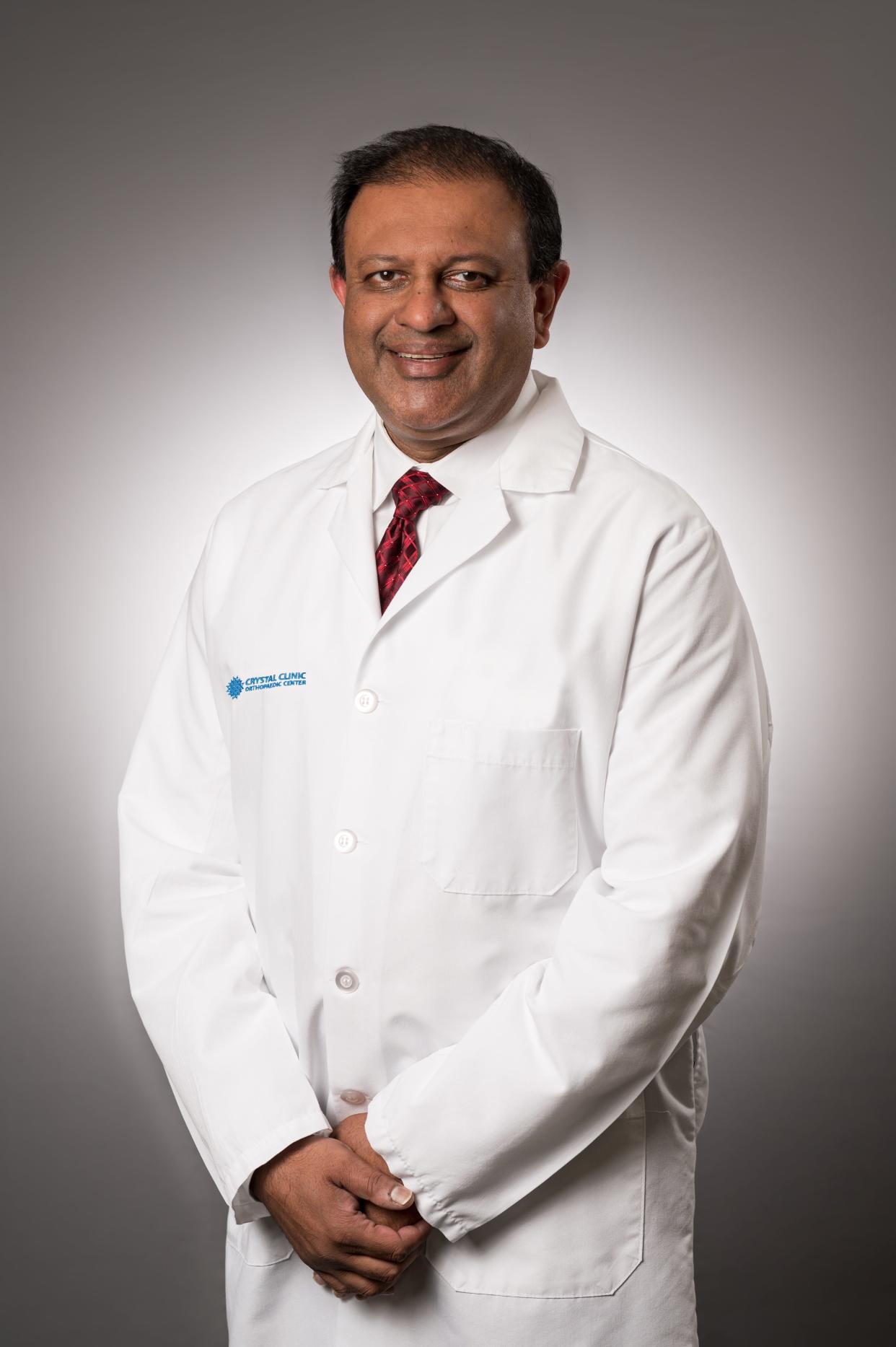Oh my aching back! Tips from a spine surgeon

Oh my aching back!
How often have you uttered that phrase?
There can be many causes for back pain, so our medical expert for this month’s Healthy Actions column is Dr. Rajiv Taliwal, an orthopedic spine surgeon for Crystal Clinic.
Healthy Actions is a look at a medical topic of interest with a local expert.
More: Betty Lin-Fisher: Links to Healthy Actions columns
This is an edited version of our interview. There also is a podcast available of our interview.
What are some common causes of back pain?
Musculoskeletal and especially back pain is one of the most common reasons why people go to see a doctor. Back pain can happen at almost any age. More often than not, it's usually a muscular issue: I did too much. I bent over. I picked up something.
The vast majority of folks that have back issues usually will resolve over time on their own. But occasionally things don't get better and that's when it's time to get extra help.

Could back pain also be the result of something more chronic and not a particular incident?
Yes, there’s always the obvious, I fell. I hurt myself. I was in an accident. A lot of times when folks come in to see us, it's hard for them to pinpoint when the problem started. It’s sort of a gradual, indolent thing and then they just say, ‘Hey, it's time to get it looked at,' so we can start off very slow. Most of the time, folks will try to take care of it on their own at home, which is what we encourage things like anti-inflammatory medications, over the counter things. Sometimes a brief period of rest. We don't recommend bed rest for any length of time and then some basic stretches and exercises, and usually those things will resolve. If they don't, that's what we usually recommend they have it checked out a little bit further.
Should people use heating pads or ice to aid in recovery?
In general for acute inflammation, like post-surgery, we recommend ice, which reduces swelling. If it's a more muscular, sort of a dull ache, sometimes moist heat such as a hot bath, a hot shower, a heating pad can be effective. Oftentimes, it sort of trial and error. We tell folks to use what feels best.
More: Q&A: Have a headache or a migraine? A doctor offers advice
What are some common back issues doctors see or treat?
Our spinal discs are basically cushion pads and all discs will wear down over time. We try to tell folks it's sort of like the treads on your tires: as they wear down, there are some degeneration and wear and tear.
Sometimes you can get an acute rupture of a disc and that's sort of like a flat tire where you're going along and all of a sudden you have a sudden rupture. That's the person who will have sudden acute onset pain. And if that disc is pinching a nerve, typically that can give you shooting symptoms — sciatic pain going down into the legs with numbness, tingling, weakness, things of that nature.
More often, just like the treads on your tires, it’s a more gradual process, so a lot of times folks will come in and they say: ‘I've had problems for six months, a year or longer where my legs feel tired and achy and numb and tingly, and I have trouble standing. I have trouble walking.’ That's really a picture of spinal stenosis, where the spinal canal slowly closes off degenerately over time.
More: New guidelines suggest heavy marijuana use be disclosed before surgery
What’s your advice when someone is experiencing back pain? Should you call your primary care doctor or a specialist?
You should reach out to whoever you can reach. Usually your primary care doctor is someone you know and that's usually a good resource. They can probably take care of the vast majority of issues and at least get just started in the right direction. We're happy to take care of folks as well. We try to avoid having folks go to emergency rooms and urgent cares unless it's really necessary. But if it's acute enough, that's always an option.
Does physical therapy help with back pain?
If we are able to maintain good core strength, posture, flexibility, endurance, these are all things that can reduce some of the stress and the impact of that pain on our back. Physical therapists are like coaches. They can show you what to do. They can show you what not to do and that's actually always a great first step. Chiropractic and massage are also modalities that can really help with acute onset of pain.
More: Car-seat safety rules have changed over the years. Here's the latest | Betty Lin-Fisher
What are some non-surgical treatments for patients?
Typically, the first thing we want to do is get a history because as we know, all back pain is not the same. We want to rule out anything really bad, such as a fracture or an infection or some type of a tumor. Those things are relatively rare, but we're always kind of on the alert for those types of situations.
The majority of the time, we recommend over-the-counter medications. We want to try to avoid heavy narcotics or medications that have an addictive potential and then mobility, a brief period of rest. We want to avoid bracing because braces can sometimes make you stiffer and actually make the symptoms worse.
Early motion, either home or directed exercise, physical therapy, massage, chiropractic, things of that nature are good.
We usually take to distinguish axial pain, meaning pain that is centered around the core, versus nerve-type pain, which are symptoms that travel either down the arms or down the legs. Either way, the majority of times, things will start to settle down on their own. The body has a natural tendency to heal itself, just like when you get a cold. Your body's defense mechanism kicks in and oftentimes things get better. So we start off with simple conservative things. If they don't get better, then our job really is to first of all figure out the source of the pain, which can be challenging.
We always want to go down the path of diagnostics before we start going deeper into anything more aggressive in terms of treatment.
More: Healthy Actions: Want to lose weight? A doctor can help you with that
Do you see patients for short period of time during an incident and then not again or do you see patients long term?
In health care we have longitudinal care. So if I'm a primary care doctor, I'm going to follow someone over the course of their life. And most specialists will take care of episodic care. So someone has a flare up of back pain. Like we said, a majority of time, it resolves, so we'll see them once or twice. Oftentimes, we'll see them back after they've had some type of therapy to make sure that they're on the right track.
Then there's folks that have chronic symptoms where you'll have good days and bad days. It'll resolve for a few months or a few years, and then it'll come back.
You have to gauge and you know the folks that tend to have more longstanding symptoms are the ones that you then will dig in a little deeper and try to figure out the source.
Unfortunately with back pain, once you have issues, it can become a longterm thing. So our job is to try to keep them from that situation. Unfortunately, we don't always have treatment options. We try to do the best we can.
More: Are you tired? You may need to go to the doctor if it persists | Betty Lin-Fisher
In what cases do people need surgery?
When we talk about the spine, we think of your spine as really basically a structural tube. And so if you have compression, if a nerve is pinched, that's going to cause symptoms. One of the primary goals is to try to relieve nerve pressure. The other thing that we have to remember is that your spine is a central core of your body. And so structurally, if that core is shifting out of position or tilted to the side, then sometimes we have to stabilize and straighten it out.
The general principle is really if a nerve is pinched or stretched and that's causing symptoms. That will be an indication for surgery or if you have a malalignment where your spine is bending or twisting in a position it shouldn't be. That's an indication to straighten that out and to stabilize the spine.
More: In need of a good night's sleep? Here's tips and help from a doctor| Betty Lin-Fisher
Any final thoughts to share on back pain?
I would probably tell you that you're not alone. It's very common and a lot of the symptoms that we talk about are probably shared by your family and your friends. So after a certain age, we're all going to have some issues with our back. But there are a lot of treatment options.
The biggest message I would tell you is just because you're seeing a surgeon doesn't mean you're necessarily going to go down the path of surgery. But even if you do need surgery, we've come a long way. I know that there's a lot of fear out there about back surgery. Someone may have remembered that they had a family member that had surgery back 20, 30, 40 years ago. Things have come a long way in terms of the recovery process, how quickly we get people through the surgery, they're up on their feet fairly quickly, back to work fairly quickly and long term for the most part, once they're healed, we really try to limit any longterm restrictions, even if they do require surgery.
Beacon Journal staff reporter Betty Lin-Fisher can be reached at 330-996-3724 or blinfisher@thebeaconjournal.com. Follow her @blinfisherABJ on Twitter or www.facebook.com/BettyLinFisherABJ To see her most recent stories and columns, go to www.tinyurl.com/bettylinfisher
This article originally appeared on Akron Beacon Journal: Experiencing back pain? A spine surgeon offers advice

